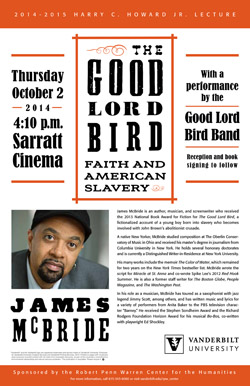James McBride earned universal praise and worldwide recognition for The Color of Water, his classic memoir of growing up black with a white Jewish mother in 1960s New York. In his subsequent novels—including Miracle at St. Anna, which was adapted into a film by Spike Lee—he has grappled with the problem of race and the legacy of slavery. In The Good Lord Bird, McBride returns to these themes but with a starkly different approach.
 The protagonist of The Good Lord Bird, an escaped slave named “Little Onion” Shackelford, is ambivalently hitched to the threadbare coattails of John Brown on his fated journey from the fields of Bleeding Kansas to Harper’s Ferry, Virginia. More than 150 years after his capture and execution, John Brown’s legacy remains ambiguous. His bloody campaign to end slavery by arming the slaves of Virginia and spurring them to rebellion undoubtedly helped to spark the Civil War. But his historical status still sparks debate: was he a charismatic hero, a bloody John-the-Baptist forerunner to the messianic Lincoln? Or was he a madman whose delusions of grandeur led him to become a religious terrorist? As Onion Shackleford explains, “a man with a cause, right or wrong, has got plenty to prove, and will make you suck sorrow if you get in the way of ’em wrongly.”
The protagonist of The Good Lord Bird, an escaped slave named “Little Onion” Shackelford, is ambivalently hitched to the threadbare coattails of John Brown on his fated journey from the fields of Bleeding Kansas to Harper’s Ferry, Virginia. More than 150 years after his capture and execution, John Brown’s legacy remains ambiguous. His bloody campaign to end slavery by arming the slaves of Virginia and spurring them to rebellion undoubtedly helped to spark the Civil War. But his historical status still sparks debate: was he a charismatic hero, a bloody John-the-Baptist forerunner to the messianic Lincoln? Or was he a madman whose delusions of grandeur led him to become a religious terrorist? As Onion Shackleford explains, “a man with a cause, right or wrong, has got plenty to prove, and will make you suck sorrow if you get in the way of ’em wrongly.”
McBride is not the first to reimagine the historical John Brown in a literary context. Most notably, Russell Banks’s acclaimed 1998 novel Cloudsplitter, a finalist for the PEN/Faulkner and Pulitzer Prizes, recounts Brown’s life through the eyes of his surviving son. McBride’s account, however, is especially compelling. First, The Good Lord Bird is a picaresque, clearly modeled on Twain’s Adventures of Huckleberry Finn, with a rascal narrator through whose eyes the author satirizes the lunacy of a corrupted world. Second, McBride imagines Brown from the perspective of an African American. Observing Brown making impassioned sermons before a white audience “made me a bit sad,” Onion recalls. “There weren’t hardly ever any Negroes present at most of them gatherings, and them that was there was doodied up and quiet as a mouse. … Everybody got to make a speech about the Negro but the Negro.”
 The novel, a fictional memoir by Onion, is presented as a found document, discovered posthumously after being rescued from a church fire. Onion—who lived most of his life as a woman—claims to be the only African American to have survived John Brown’s foiled raid on Harper’s Ferry. The Good Lord Bird is a radical reimagining of “the Old Man,” as Onion calls him, as a divine lunatic, both ridiculous and righteous: what you might get if you crossed Falstaff with Captain Ahab and Charlton Heston’s Moses. Fearless, zealous, ruthlessly determined, and clearly insane, McBride’s Brown literally dodges bullets, administers vengeance—“He got downright holy when it was killin’ time,” Onion says—and thunders out endless prayers: “He was a plain terror in the praying department,” says Onion. “Just when he seemed to wrap up one thought, another come rumbling out and crashed up against the first, and then another crashed up against that one, and after a while they all bumped and crashed and commingled against one another till you didn’t know who was who and why he was praying it, for the whole thing come together like the tornadoes that whipped across the plains, gathering up the sagebrush and boll weevils and homesteads and tossing them about like dust.”
The novel, a fictional memoir by Onion, is presented as a found document, discovered posthumously after being rescued from a church fire. Onion—who lived most of his life as a woman—claims to be the only African American to have survived John Brown’s foiled raid on Harper’s Ferry. The Good Lord Bird is a radical reimagining of “the Old Man,” as Onion calls him, as a divine lunatic, both ridiculous and righteous: what you might get if you crossed Falstaff with Captain Ahab and Charlton Heston’s Moses. Fearless, zealous, ruthlessly determined, and clearly insane, McBride’s Brown literally dodges bullets, administers vengeance—“He got downright holy when it was killin’ time,” Onion says—and thunders out endless prayers: “He was a plain terror in the praying department,” says Onion. “Just when he seemed to wrap up one thought, another come rumbling out and crashed up against the first, and then another crashed up against that one, and after a while they all bumped and crashed and commingled against one another till you didn’t know who was who and why he was praying it, for the whole thing come together like the tornadoes that whipped across the plains, gathering up the sagebrush and boll weevils and homesteads and tossing them about like dust.”
The Good Lord Bird is peppered with historical figures whose paths intersected with Brown’s during his three years of great notoriety. Jeb Stuart, who would go on to become perhaps the most daring and dashing of Confederate cavalry officers, appears first in Kansas and later at Harper’s Ferry. Harriet Tubman makes a stirring appearance at one of Brown’s rallies. Frederick Douglass—an ally of Brown’s who urged him to abandon the plan to attack the Harper’s Ferry armory—gets a rather unflattering treatment as a boozy lecher and turncoat.
Mistaken by Brown for a girl, Onion discovers that there are advantages to his mistaken identity—he is given lighter duties, becoming a relatively spoiled mascot to Brown and his band—and continues to hide his gender throughout most of the novel. This decision becomes both a plot device and a means of commenting on the dual nature of African-American identity: “Even though I’d gotten used to living a lie—being a girl—it come to me this way: being a Negro’s a lie, anyway. Nobody sees the real you. Nobody knows who you are inside. You just judged on what you are on the outside whatever your color. Mulatto, colored, black, it don’t matter. You just a Negro to the world.”
Onion’s ruse holds up less frequently among his fellow slaves. He briefly separates from Brown’s band and ends up a servant in a brothel, where he falls for a popular prostitute, runs afoul of the field slaves—who are kept like animals in an outdoor pen—and has his first experiences with martyrdom, when he witnesses the foiling of a slave rebellion and the defiant courage of its unlikely leader. In this instance and in the movement toward John Brown’s inevitable end, The Good Lord Bird abandons its satirical tone, allowing McBride to dispense withering remarks about the silencing of African-American voices.
Unlike his clearest inspiration, Huck Finn—who is sickened by the violence he witnesses along his journey down the Mississippi—Onion seems to approach the carnage Brown dispenses with a detachment reminiscent of a Quentin Tarantino film. Onion’s routine aloofness to the horrors of violence, however, seems less like a postmodern aesthetic than the consequences of the hopelessness of both a life in bondage and the failure of John Brown’s vision: “Some things in this world just ain’t meant to be, not in the times we want ’em to, and the heart has to hold it in this world as a remembrance, a promise for the world that’s to come,” he says. “There’s a prize at the end of all of it, but still, that’s a heavy load to bear.”
[This review was updated with new event details on September 26, 2014.]

Ed Tarkington holds a B.A. from Furman University, an M.A. from the University of Virginia, and a Ph.D. from the creative-writing program at Florida State University. His debut novel, Only Love Can Break Your Heart, is forthcoming from Algonquin Books. He lives in Nashville.
Tagged: Fiction





